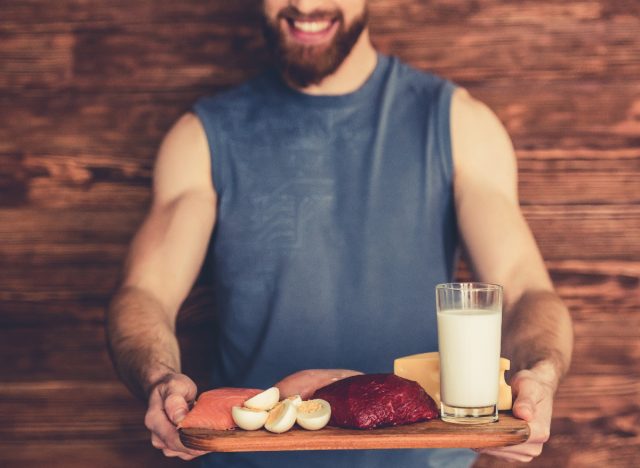4 Ways to Gain Muscle Mass Instead of Fat, Fitness Pro Says

Let's be honest: Most of us wish we could snap our fingers and magically have six-pack abs, toned arms, and a body we're excited to show off at the beach. Sounds dreamy, right? Unfortunately, that's not how it works. Like any other health or fitness goal, packing on muscle without adding inches to your waistline requires plenty of hard work, time in the gym, and some nutritional know-how. We're here to fill you in with a fitness expert's advice on how to gain muscle mass without gaining fat.
Your body requires additional energy (calories) on a regular basis in order to repair and grow muscle tissue, research says. Without a caloric surplus and adequate protein intake, your muscle-building efforts in the gym may be futile. The problem? Well, eating in a caloric surplus is a double-edged sword. While doing so is necessary in order to build muscle, it also can add excess body fat if not appropriately planned. For example, creating one kilogram of muscle mass requires an energy surplus of roughly 1,500 to 2,000 calories daily—the equivalent of two to three extra meals per day for most people.
If you're looking to add some bulk to your frame without putting on extra body fat, we've got you covered. We chatted with fitness expert Dan Johnston, CPT, a certified personal trainer and strength and conditioning coach, who shares four effective ways to boost muscle mass while burning fat and maintaining a lean, beach-worthy physique.
Keep reading to learn how to gain muscle without gaining fat, then be sure to check out 3 Perfect At-Home Exercises To Build Muscle, Trainer Reveals.
Consume more calories (but not too much).

Your body requires a substantial amount of energy to build muscle. As mentioned above, adding one kilogram of muscle means eating plenty of extra calories—some of which help create lean muscle, while the remainder gets stored as body fat. However, a more effective way to gain muscle without gaining fat is to eat in a smaller caloric surplus.
Aim to consume between 200 to 300 additional calories daily to add muscle mass while minimizing fat gain. This eating habit will target muscle growth while keeping a trim figure. "Eating in a smaller caloric surplus ensures that you not only fuel your body enough to gain muscle but minimizes your body's chances at turning that into fat gain," says Johnston.
Focus on the intensity of your workouts.
There's no way around it: You need to put in the work if you want to build muscle mass. That means consistently performing strenuous workouts with sufficient intensity to cause wear and tear on your muscles, allowing them to repair and grow. If you neglect the intensity of your workouts while continuing to eat in a calorie surplus, you'll add inches to your waistline instead of your biceps.
"Making sure your intensity in the gym isn't dropping off can help ensure you're making the most out of your time in the gym if your goal is to gain muscle mass," says Johnston. "Staying consistent with a well-managed workout program and appropriate intensity for your session is key to gaining muscle mass and working to prevent fat gain."
Consistency is key.

Like any worthwhile pursuit in life, consistently showing up day in, day out, is essential for achieving your goals. This sentiment rings especially true for building muscle while avoiding fat gain. But that doesn't mean overdoing it by lifting weights for hours on end, which can lead to burnout, fatigue, and other nasty symptoms of overtraining. Instead, maintain consistency with your workouts, rest, recovery, and nutrition to optimize muscle gains.
"Staying consistent with your workout schedule can prevent the number of calories you're consuming throughout the week to overcome the number of calories you're burning," Johnston explains. "Staying within a caloric surplus of around 200 to 300 extra calories has been shown to minimize the amount of fat gained while gaining a good amount of muscle."
Adopt healthy lifestyle habits.
The most effective strategy for any health or fitness goal is to adopt healthy lifestyle habits. Besides regular exercise and resistance training, the best lifestyle habits that promote muscle growth and fat loss are eating a healthy, well-balanced diet, getting plenty of high-quality sleep, and avoiding alcohol and smoking. Aim to get most of your calories from whole foods, including fruits, vegetables, whole grains, legumes, nuts, and seeds. Also, prioritize sleep by consistently getting the minimum recommended seven hours every night.
"Getting the majority of your calories from fruits, vegetables, and whole grains is great because not only do they provide your body with many needed vitamins and nutrients, but they're also highly satiating, which can help prevent overeating," says Johnston.









